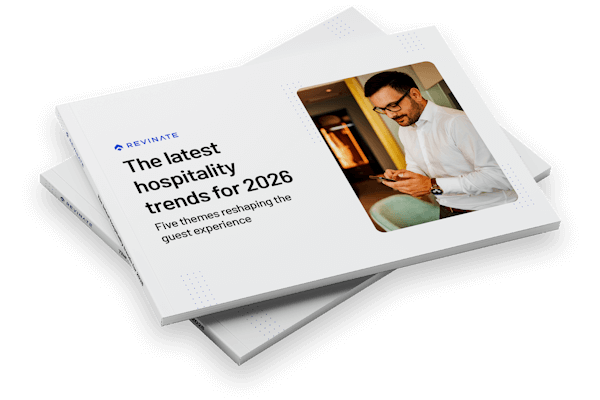Real hoteliers, real results: How properties around the world are turning cart abandonment into profit
Real hoteliers, real results: How properties around the world are turning cart abandonment into profit
Last week’s cart abandonment recovery playbook outlined strategies that you could deploy at your properties. But as any hotelier will tell you, there’s a difference between theory and reality — especially when you’re trying to hit your targets as quickly as possible. Or, you’re trying to convince the owners that a new initiative is worth the investment.
That’s why the real success stories from properties that have implemented these strategies matter so much. The results speak louder than any guide ever could.
From Hong Kong to Jamaica, from extended-stay properties to luxury resorts, hoteliers are discovering that cart abandonment recovery isn’t just about recapturing a few lost bookings. It’s becoming one of their most reliable direct booking drivers, often paying for the tech within the first few months.
Let’s look at the real numbers from real properties.
Asia Pacific success: Ovolo Group’s remarkable ROI
Stephen Howard, Group Director of Marketing at Ovolo Hotels, added cart abandonment to their strategy in April 2022. The contemporary hotel group operates across Hong Kong and Australia, and within two months, they were seeing results that exceeded even their optimistic projections.
Here’s what happened across Ovolo’s portfolio.
Ovolo’s cart abandonment results:
- Ovolo Woolloomooloo: 61% open rate, 52x ROI
- Ovolo South Yarra: 64% open rate, 20x ROI
- Ovolo 1888 Darling Harbour: 54% open rate, 18x ROI
- Ovolo Laneways: 61% open rate, 11x ROI
- Ovolo The Valley: 55% open rate, 11x ROI
- The Inchcolm by Ovolo: 67% open rate, 10x ROI
- Ovolo Nishi: 62% open rate, 8x ROI
- Mamaka by Ovolo: 67% open rate, 4x ROI
What made Ovolo’s approach so effective? They followed the playbook’s core principle: Keep it simple. Their first email contained fewer than 50 words with one clear call-to-action. The copy focused on the benefits of booking direct, particularly the flexibility to cancel reservations — something OTAs typically don’t offer without penalties.
“Cart Abandonment is a powerful solution in our technology stack and one that I know definitely drives ROI,” Stephen says. And those ROI numbers prove it.
Caribbean luxury: Half Moon Resort’s impressive recovery
Down in Montego Bay, Half Moon Resort demonstrated how luxury properties can capture significant revenue from cart abandonment. Their automated two-part drip campaign re-engages travelers who started but didn’t complete their booking process.
Half Moon’s one-year results:
- 70% open rate
- 10% click-through rate
- 780+ room nights booked
Half Moon’s approach highlights an important element of the multi-channel strategy outlined in the cart abandonment playbook. Each email includes a direct link to email their reservations team, creating an easy path for guests who prefer personal interaction before booking. This bridges the gap between automated marketing and human connection — crucial for high-value luxury bookings.
North American extended-stay: Level Los Angeles
Level Los Angeles—South Olive proves that cart abandonment strategies work across different property types. Their automated campaign targets potential guests who showed strong booking intent but didn’t complete their reservation.
Level LA’s seven-month performance:
- 53% open rate
- 5.7% click-through rate
- 684 room nights recovered
Level’s timing strategy exemplifies best practices from the comprehensive guide. They send the first email within one minute of cart abandonment, then follow up with a second email two days later. That second email includes information on hotel amenities and a phone number for guests who prefer to book over a call.
Kate Francois, Director of Hospitality Marketing at Level’s parent company, Onni Group, explains the broader impact: “Before Revinate, our data was messy, hard to work with, and provided no insights. Today, thanks to Revinate, we not only leverage data to drive bookings, but also to improve the guest experience on property.”
The multi-channel advantage: Pacific Hospitality Group’s comprehensive approach
Pacific Hospitality Group’s success illustrates why the most effective cart abandonment strategies go beyond email. Marc Winchell, Corporate CRM Manager at Pacific Hospitality Group, oversees a diverse portfolio of branded and independent properties and has seen firsthand how comprehensive cart abandonment becomes a revenue engine.
At Pasea Hotel & Spa, their automated cart abandonment drip campaign targets guests who abandoned the booking process. This strategic campaign has generated $250K in room revenue, with a 66% open rate and 8.3% click-through rate — far above industry averages.
Pacific Hospitality Group’s results:
- 66% email open rate for cart abandonment at Pasea Hotel & Spa
- $13M lifetime revenue within one year of launch
- $14K average room revenue per campaign
“Revinate instantly gave us a centralized hub for our guest marketing efforts. Before, efforts were siloed. We are a year into our journey with Revinate and seeing our guest database grow with a measurable shift in our direct booking strategy,” Marc explains.
Pacific Hospitality Group’s success demonstrates the power of treating cart abandonment as part of a larger guest engagement strategy rather than just an isolated email campaign.
Why automation matters for busy marketing teams
One consistent theme across these success stories is efficiency. Properties implementing cart abandonment recovery aren’t adding significant workload to their marketing teams — they’re creating systems that work automatically.
Stephen from Ovolo captures this perfectly: “Once it’s set up, Cart Abandonment works in the background to drive direct bookings, freeing up the marketing team to work on other projects.”
Similarly, Level’s campaign has proven to be a significant revenue driver while requiring minimal ongoing effort once the initial setup was complete.
This automation advantage is particularly crucial for marketing teams that already manage multiple properties, seasonal campaigns, and daily operational demands. Cart abandonment recovery becomes an “always-on” revenue stream that doesn’t compete for limited marketing resources.
Diverse properties, consistent results
What’s particularly noteworthy about these examples is the variety of property types seeing strong results:
- Independent luxury resorts like Half Moon, where personalized service is paramount, achieve 70% open rates
- Contemporary hotel groups like Ovolo, operating across multiple markets, see up to 67% open rates and exceptional ROI
- Extended-stay brands like Level Hotels, serving business travelers and long-term guests, are recovering 684 room nights through automation
- Management companies like Pacific Hospitality Group, overseeing diverse property portfolios, generating $14K average revenue per campaign
The consistency of results across these different property types and markets suggests that cart abandonment recovery strategies are broadly applicable, not limited to specific hotel categories or guest segments.
Beyond email: The importance of multi-channel strategies
While email remains the foundation of most cart abandonment campaigns, the highest-performing properties understand that different guests prefer different communication methods. Our original playbook emphasized this multi-channel approach, and these success stories validate its importance.
Half Moon’s integration of email-to-human connection, Level’s inclusion of phone booking options, and Pacific Hospitality Group’s comprehensive guest engagement strategy all demonstrate how cart abandonment recovery works best as part of a broader, multi-touchpoint approach.
Some guests respond immediately to email reminders. Others prefer text messages for time-sensitive communications. Still, others — particularly for high-value bookings — want to speak with a reservations agent to ask specific questions about amenities, policies, or special requests.
The revenue impact: Numbers that matter
Let’s put these results in perspective. Half Moon’s 780+ recovered room nights represent significant revenue that would have been lost without their cart abandonment strategy. Pacific Hospitality Group’s $14K average revenue per campaign adds up quickly across multiple properties and campaigns throughout the year.
For Ovolo, the ROI numbers speak for themselves — particularly the 52x return at Ovolo Woolloomooloo. Even their lowest-performing property achieved 4x ROI, which exceeds the performance of most marketing initiatives.
At Pacific Hospitality Group, their cart abandonment campaign at Pasea Hotel & Spa drove $250K in room revenue with performance metrics well above industry standards.
These aren’t marginal improvements. They’re substantial revenue gains that directly impact hotel profitability and help offset rising customer acquisition costs.
Implementation insights from real properties
Several practical insights emerge from these success stories:
Timing matters. Level’s approach of sending the first email within one minute of abandonment, followed by a strategically timed second email, reflects the importance of reaching guests while their interest is still high.
Simplicity works. Ovolo’s success with emails containing fewer than 50 words demonstrates that clear, focused messaging often outperforms elaborate campaigns.
Human connection enhances automation. Half Moon’s integration of direct reservations team contact and Level’s phone booking option show how automated campaigns can facilitate personal interaction when guests need it.
Consistency drives results. All of these properties treat cart abandonment as an ongoing strategy rather than a one-time campaign, allowing the automation to work continuously in the background.
Comprehensive strategy drives results. Pacific Hospitality Group’s approach of integrating cart abandonment with broader guest engagement initiatives demonstrates how these campaigns work best as part of a complete marketing strategy.
What this means for your property
These success stories demonstrate that cart abandonment recovery works across different geographies, property types, and guest segments. The strategies outlined in the playbook aren’t theoretical — they’re being implemented successfully by properties facing the same challenges you encounter daily.
Cart abandonment recovery isn’t just about sending follow-up emails. It’s about creating systematic approaches that meet guests where they are, when they’re ready to engage, through their preferred communication channels.
Whether you’re managing an independent luxury resort, overseeing a multi-property portfolio, or operating extended-stay accommodations, the fundamentals remain consistent: Capture guest information before they abandon their cart, follow up strategically across multiple channels, and make it easy for guests to complete their booking through their preferred method.
The properties featured here started with the same cart abandonment rates that frustrate hoteliers everywhere. They didn’t accept those losses as inevitable and decided to implement systematic recovery strategies.
Their results demonstrate that cart abandonment recovery has evolved from a nice-to-have marketing tactic to an essential component of direct booking strategy. With email attribution becoming increasingly important and customer acquisition costs continuing to rise, recovering lost bookings represents one of the most cost-effective ways to drive incremental revenue.
Ready to implement cart abandonment recovery at your property? These success stories prove the strategies work — the question is whether you’re prepared to capture the revenue that’s currently walking away from your booking engine.
Related links:
How Ovolo Hotels realized 52x ROI with Revinate Cart Abandonment within 2 months
Half Moon’s cart abandonment campaign drives 780+ room nights
How Revinate helped Level Hotels & Furnished Suites’ marketing team become a data-first organization
This site is protected by reCAPTCHA and the Google Privacy Policy and Terms of Service apply. View our Terms & Conditions here. *Required fields.






